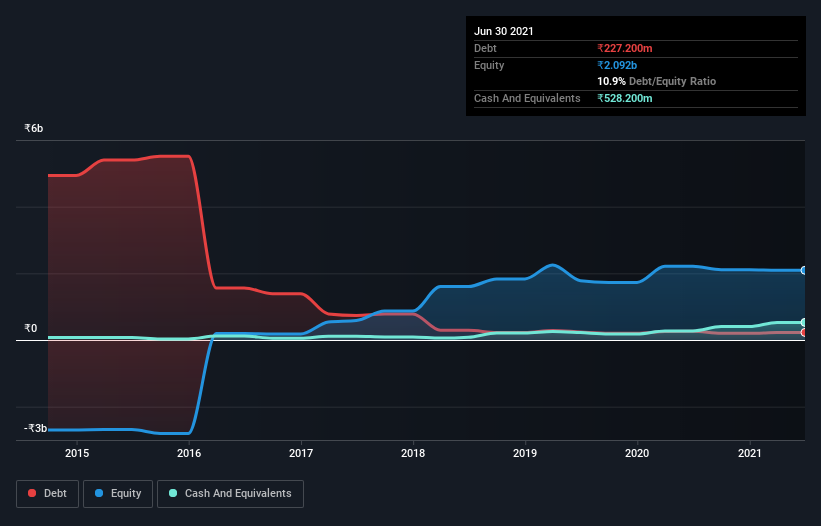Health Check: How Prudently Does Ashima (NSE:ASHIMASYN) Use Debt?

The external fund manager backed by Berkshire Hathaway's Charlie Munger, Li Lu, makes no bones about it when he says 'The biggest investment risk is not the volatility of prices, but whether you will suffer a permanent loss of capital.' So it seems the smart money knows that debt - which is usually involved in bankruptcies - is a very important factor, when you assess how risky a company is. As with many other companies Ashima Limited (NSE:ASHIMASYN) makes use of debt. But should shareholders be worried about its use of debt?
What Risk Does Debt Bring?
Debt assists a business until the business has trouble paying it off, either with new capital or with free cash flow. If things get really bad, the lenders can take control of the business. However, a more common (but still painful) scenario is that it has to raise new equity capital at a low price, thus permanently diluting shareholders. Having said that, the most common situation is where a company manages its debt reasonably well - and to its own advantage. The first step when considering a company's debt levels is to consider its cash and debt together.
Check out our latest analysis for Ashima
What Is Ashima's Net Debt?
As you can see below, Ashima had ₹227.2m of debt at March 2021, down from ₹259.8m a year prior. But on the other hand it also has ₹528.2m in cash, leading to a ₹301.0m net cash position.

A Look At Ashima's Liabilities
The latest balance sheet data shows that Ashima had liabilities of ₹408.7m due within a year, and liabilities of ₹191.1m falling due after that. On the other hand, it had cash of ₹528.2m and ₹176.7m worth of receivables due within a year. So it actually has ₹105.1m more liquid assets than total liabilities.
This surplus suggests that Ashima has a conservative balance sheet, and could probably eliminate its debt without much difficulty. Simply put, the fact that Ashima has more cash than debt is arguably a good indication that it can manage its debt safely. When analysing debt levels, the balance sheet is the obvious place to start. But you can't view debt in total isolation; since Ashima will need earnings to service that debt. So when considering debt, it's definitely worth looking at the earnings trend. Click here for an interactive snapshot.
Over 12 months, Ashima made a loss at the EBIT level, and saw its revenue drop to ₹1.6b, which is a fall of 25%. To be frank that doesn't bode well.
So How Risky Is Ashima?
By their very nature companies that are losing money are more risky than those with a long history of profitability. And in the last year Ashima had an earnings before interest and tax (EBIT) loss, truth be told. And over the same period it saw negative free cash outflow of ₹89m and booked a ₹144m accounting loss. With only ₹301.0m on the balance sheet, it would appear that its going to need to raise capital again soon. Overall, its balance sheet doesn't seem overly risky, at the moment, but we're always cautious until we see the positive free cash flow. There's no doubt that we learn most about debt from the balance sheet. But ultimately, every company can contain risks that exist outside of the balance sheet. We've identified 2 warning signs with Ashima (at least 1 which is potentially serious) , and understanding them should be part of your investment process.
When all is said and done, sometimes its easier to focus on companies that don't even need debt. Readers can access a list of growth stocks with zero net debt 100% free, right now.
If you decide to trade Ashima, use the lowest-cost* platform that is rated #1 Overall by Barron’s, Interactive Brokers. Trade stocks, options, futures, forex, bonds and funds on 135 markets, all from a single integrated account. Promoted
If you're looking to trade Ashima, open an account with the lowest-cost platform trusted by professionals, Interactive Brokers.
With clients in over 200 countries and territories, and access to 160 markets, IBKR lets you trade stocks, options, futures, forex, bonds and funds from a single integrated account.
Enjoy no hidden fees, no account minimums, and FX conversion rates as low as 0.03%, far better than what most brokers offer.
Sponsored ContentNew: Manage All Your Stock Portfolios in One Place
We've created the ultimate portfolio companion for stock investors, and it's free.
• Connect an unlimited number of Portfolios and see your total in one currency
• Be alerted to new Warning Signs or Risks via email or mobile
• Track the Fair Value of your stocks
This article by Simply Wall St is general in nature. We provide commentary based on historical data and analyst forecasts only using an unbiased methodology and our articles are not intended to be financial advice. It does not constitute a recommendation to buy or sell any stock, and does not take account of your objectives, or your financial situation. We aim to bring you long-term focused analysis driven by fundamental data. Note that our analysis may not factor in the latest price-sensitive company announcements or qualitative material. Simply Wall St has no position in any stocks mentioned.
*Interactive Brokers Rated Lowest Cost Broker by StockBrokers.com Annual Online Review 2020
Have feedback on this article? Concerned about the content? Get in touch with us directly. Alternatively, email editorial-team (at) simplywallst.com.
About NSEI:ASHIMASYN
Ashima
Manufactures and sells denim fabrics and readymade garments in India.
Proven track record with adequate balance sheet.
Similar Companies
Market Insights
Community Narratives



